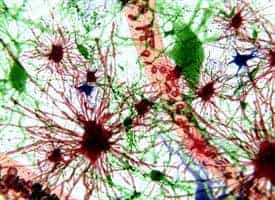A new award from the CHDI Foundation will advance promising research that aims to slow the progression of Huntington’s disease. The funding, anticipated to total more than $10.5 million over next five years, will help University of Rochester Medical Center (URMC) scientists develop a stem cell-based therapy that swaps sick brain cells for healthy ones.
The new award will go to the lab of Steve Goldman, M.D., Ph.D., the co-director of the URMC Center for Translational Neuromedicine, which has research operations in both Rochester and at the University of Copenhagen.
Huntington’s is a hereditary neurodegenerative disease characterized by the loss of medium spiny neurons, a nerve cell in the brain that plays a critical role in motor control. As the disease progresses over time and more of these cells die, the result is involuntary movements, problems with coordination, and cognitive decline, depression, and often psychosis. There is currently no way to slow or modify this fatal disease.
The new award will support research that builds upon findings published by Goldman earlier this year in the journal Nature Communications showing that researchers were able to slow the progression of the disease in mice by transplanting healthy human support cells, called glial progenitor cells, into the animals’ brains.
Researchers had observed that medium spiny neurons become overexcited due to a genetic flaw caused by the disease that prevents cells from taking up enough potassium. This deficit not only gives rise to motor control and cognitive symptoms, but also triggers a toxic chain reaction that ultimately kills the cells. One of the roles of glial cells is to help these neurons to maintain a proper balance and supply of potassium. However, because glia cells also become sick during the disease, they are unable to perform this function.
During the study, Goldman and his URMC colleagues, including Abdellatif Benraiss, Ph.D. and Maiken Nedergaard, M.D., D.M.Sc., transplanted glial progenitor cells they had derived from human stem cells into the brains of transgenic mice with Huntington’s disease. They observed that the new glial cells took over for the sick ones and were able to stabilize and even rescue neurons that were being lost to the disease, slowing its progression and allowing the animals to live longer. These findings demonstrated that glial cell dysfunction is a major part of Huntington’s and provided researchers and clinicians with a completely new approach to potentially treat the disease.
The new award will enable the researchers to further understand the basic biology of these cells so that they can refine the process of preparing them for implantation before going to clinical trials, a process that should be accelerated due to the fact that the research will involve human cells.
The CHDI Foundation is a privately-funded, not-for-profit biomedical research organization devoted to Huntington’s disease. The organization’s mission is to work with academic and industry scientists to develop therapies that will slow the progression of Huntington’s disease and provide meaningful clinical benefit to patients.
If our reporting has informed or inspired you, please consider making a donation. Every contribution, no matter the size, empowers us to continue delivering accurate, engaging, and trustworthy science and medical news. Independent journalism requires time, effort, and resources—your support ensures we can keep uncovering the stories that matter most to you.
Join us in making knowledge accessible and impactful. Thank you for standing with us!

